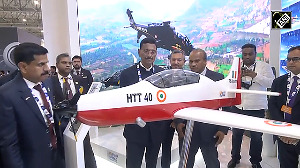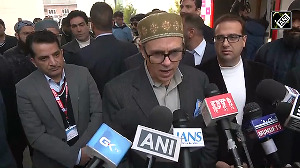Nearly 10,000 Non-Resident Indians who invested Rs 10 per share for a stake in India's first greenfield airport 10 years back are a happy lot today.
The country's private airport players, including the two Ambani groups, are now willing to pay as much as Rs 350 per share to the NRIs.
The movers and shakers in the airport modernisation industry have now set their eyes on the Cochin International Airport Limited, which is planning to go public this year.
The Indian government's ambitious plans to modernise and privatise the country's two biggest airports -- in Mumbai and Delhi -- turned out to be controversial early this month.
But CIAL, a unique aviation success story in the private-public sector, is the attention grabber in the airport modernisation story.
The Cochin airport has many firsts to its credit. It is India's first aviation venture owned by the public. All the other airports and other infrastructural facilities are owned, managed and operated by the government (read civil aviation ministry, the Airports Authority of India and the Directorate General of Civil Aviation).
Before CIAL gets listed on the Bombay Stock Exchange -- the first Indian airport to hit the capital market -- the who's who of India's private airport industry are wooing the big NRI shareholders offering them huge premiums.
So who is wooing whom?
In the fray to pick up NRI stakes in CIAL are the Mukesh Ambani Group, the Anil Ambani Group, the consortium led by GVK Industries Ltd and the Airports Company of South Africa that was awarded the work for the Mumbai airport, and the Hyderabad-based GMR Group that got the Delhi airport modernisation contract.
And whose stakes are they eyeing?
Four NRI directors in CIAL jointly hold 36 per cent stake in the airport. They are N V George, the Sharjah-based promoter of Geo Electricals Trading & Contracting Company Ltd; Yusuf Ali, owner of the Middle East-based business empire EMKE Group, P Mohammed Ali, owner of the Oman-based construction giant Gulfar Engineering & Contracting LLC; and E M Babu, who heads the Dubai-based trading company Majeed Bukatara Trading.
Of these four NRI directors in the airport company, N V George has the highest individual shareholding in the company -- 18 crore (180 million) shares.
Officials at CIAL disclosed that merchant bankers and dealmakers from the Ambani groups and other airport private players have been contacting the NRI shareholders.
"We heard the NRI shareholders are offered as much as Rs 350 per share. We have not yet got received any confirmation whether these large NRI shareholders want to sell their private equity in the airport company," an airport official told rediff.com.
But, he said, many of the minor NRI shareholders are eager to sell their stakes, if the price offered is at such a premium.
What is the business model that is attracting corporate India to scout for stakes in Cochin Airport?
The airport is owned by Cochin International Airport Limited, a public limited company in which the Kerala government has the single largest stake -- 26 per cent. CIAL is managed by a board of directors comprising political leaders, industrialists, NRIs and representatives of financial institutions. Besides the Kerala government, CIAL's shareholders include the Federal Bank, State Bank of Travancore, Bharat Petroleum, Air India, Housing and Urban Development Corporation, and nearly 10,000 NRIs.
The NRI stakeholders hail from about 30 countries including Australia, Austria, Botswana, Brunei, Canada, Uganda, Egypt, Germany, Hong Kong, Indonesia, Iran, Italy, the United States, Japan, Saudi Arabia, Kuwait, Kenya, Kuwait, Malaysia, Mexico, Nigeria, Oman, Qatar, South Africa, Singapore, Sweden, Switzerland and the United Kingdom.
In the first phase, around 1,500 acres of land was acquired for the airport and the airport has been constructed with facilities matching international standards.
The total project cost for the airport was around Rs 315 crore (Rs 3.15 billion) -- when it got completed in 1999 -- financed through a paid up equity capital of Rs 85 crore (Rs 850 million) and a term loan of Rs 218 crore (Rs 2.18 billion). The balance has been tied up through interest free security deposits from various airport service providers.
The project cost is very low compared to the cost of other similar airports.
And the business attraction?
CIAL posted a profit of Rs 45 crore (Rs 450 million) during 2004-05 on a revenue of Rs 100 crore (Rs 1 billion).
The airport has now chalked out ambitious plans. "Our expansion plans are to ensure that this becomes the country's most successful and profit-making airport in the country," says CIAL managing director V J Kurien, an IAS officer, who is the brain behind the project.
According to him, in the next two years, projects worth Rs 3,000 crore (Rs 30 billion) will be executed in the airport, and its adjoining areas. "The biggest advantage of this airport is that we have lots of land for expansion," he pointed out.
The ambitious expansion plans include:
- A low-cost airline. The Cochin airport is planning a budget airline. A consultancy agency IF&FS has already conduced a feasibility study for the project, which has suggested that a budget airline, flying to national and international destinations from CIAL, has immense scope.
- The airline launch will be followed by the setting up of India's largest aircraft maintenance company. The details of how to make Cochin the hub of aircraft maintenance work are being worked out. The plan, CIAL officials disclosed, is to form an entirely different company to create a large aircraft maintenance hub at the airport. The company may be formed on the lines of the CIAL.
- Also on the anvil are the launch of a few five-star hotels, a shopping mall, a golf course and an airport township around the airport, the land for which is already under CIAL possession.





